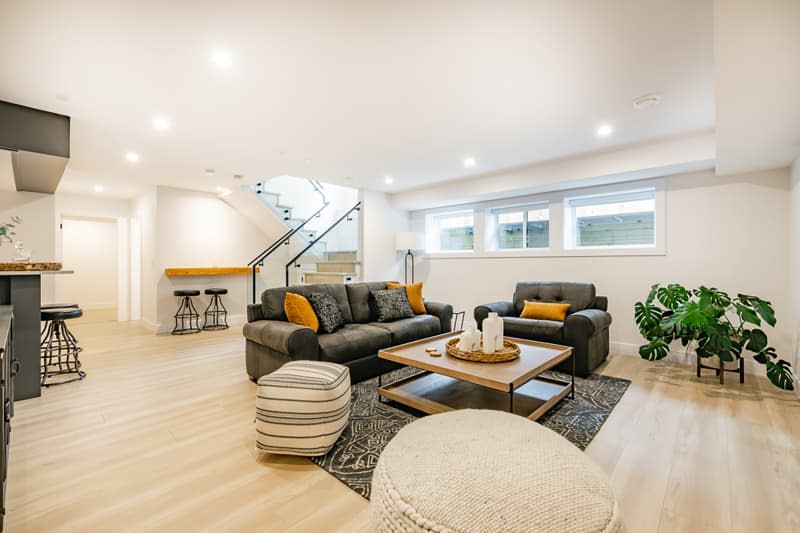I Bought My Home Just for This Feature and Now I Totally Regret It

When my husband and I bought our house in Staten Island, New York, nearly six years ago, we were thrilled that it checked off one very big must-have on our wish list: It had a basement. After years of apartment living, we craved more storage space as well as a casual spot to hang out, watch TV, and listen to music. Little did we know that our love affair with having a basement would be short-lived and we would ultimately seriously reconsider having one on our list of must-haves for our next home search.
Although our little island is more metropolitan than tropical, we get hit rather hard by storms. We’re lucky enough not to live in a flood zone, but even that’s not much help anymore — Hurricane Ida unleashed about two inches of water in our beloved finished basement back in 2021. Fortunately, it wasn’t a complete disaster for our basement, but it was an indicator of a bigger problem that goes by the name of Mother Nature.
There doesn’t seem to be any light, refreshing showers in New York City anymore. When it rains, it rains hard. Torrential downpours, high winds, and street flooding are the norm. Every time the meteorologists discuss rain in terms of inches, my husband and I cringe.
When we move on from this home in a couple of years, we’ll be looking for spare space and storage above ground rather than below. And we’re not the only house hunters to make this shift in thinking.
“The allure of basements has diminished for some homeowners in the aftermath of the recent years of intense storms,” says Fran Lisner, real estate salesperson at Daniel Gale Sotheby’s International. She notes that the stress of post-flood cleanup has caused many homeowners like us in the New York area to reassess their priorities. “Basements are no longer a top must-have for every buyer,” she says.
What House Hunters Should Know About Basements
If we decide to stay in the New York/New Jersey metropolitan area, chances are there will be a basement, so we may have to compromise some. Here’s what Lisner and Gerard Splendore, a broker with Coldwell Banker Warburg, say to keep an eye out for during our next house hunt.
Check Out the Local Water Table
It’s not enough anymore to simply confirm whether or not a home is in a flood zone. “If buyers are bidding on a house with a basement, I suggest they look at the local water table, speak to neighbors about their basements, and, if at all possible, try to view a home after, or ideally during, a rainstorm, says Gerard Splendore, a broker with Coldwell Banker Warburg.
Don’t Skip the Inspection
Has the nonsensical trend of home buyers waiving the home inspection finally ceased? I sure hope so, especially if a basement is involved. Lisner and Splendore both recommend hiring a professional who can assess for water damage, mold, and structural issues.
Splendore has firsthand experience with how important this step is. “I had a home inspection for a house on which I bid just as an unexpected thunderstorm began, and due to a storm sewer blockage in the street outside the house, water poured into the house like a waterfall,” he says.
Check on Waterproofing
Basements harbor dampness even on a sunny, dry day, so imagine what can happen when it rains. Ensure the basement (here are the four types) has things like sealants, drainage systems, and backup sump pumps. (Note: We have two pumps that have gotten overwhelmed in bad storms.)
Consider Flood Insurance
Homeowners’ insurance typically covers flooding from plumbing issues, but these policies do not cover weather-related flooding. Those in flood zones should certainly purchase flood insurance, but those in the “safer” zones might want to consider it, too. “Understand the implications of flood insurance and ensure it is available and affordable in the area,” says Lisner.
Renovations May Be Needed
While we won’t be completely averse to having a basement in our next house, we are wiser about what it can be used for beyond our washer, dryer, oil tank, and hot water tank.
“I encourage buyers to be realistic about basement renovations and usage,” says Splendore, who adds that it’s not a bad idea to speak with some local contractors who specialize in basement renovations. He also recommends talking to their past clients and even visiting their work where possible — not just looking at photos online — to see the quality of the renovation.
Above all, Splendore recommends this to clients: “If they do purchase a house with a basement, wait until after a major rainstorm to begin renovation.”

